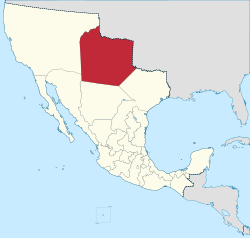Santa Fe de Nuevo Mexico
| Santa Fe de Nuevo México | ||||||
| Province of the Viceroyalty of New Spain (1598-1821), Territory of the First Mexican Empire (1821–23), Territory of the First Mexican Republic (1823-1848) |
||||||
|
||||||
|
||||||
| Capital |
Santa Fe 35°40′N 105°57.9′W / 35.667°N 105.9650°WCoordinates: 35°40′N 105°57.9′W / 35.667°N 105.9650°W |
|||||
| Spanish governors | ||||||
| • | 1598–1610 (first) | Juan de Oñate | ||||
| • | 1818–1822 (last) | Facundo Melgares | ||||
| Mexican governors | ||||||
| • | July – Nov. 1822 (first) | Francisco Xavier Chávez | ||||
| • | August – Sept. 1846 (last) | Juan Bautista Vigil y Alarid | ||||
| History | ||||||
| • | Spanish missions in New Mexico | 1598 | ||||
| • | Mexican Independence | 1821 | ||||
| • | Texian Independenceb | March 2, 1836 | ||||
| • | Mexican–American War | from April 25, 1846 | ||||
| • | Surrender to U.S. occupation | September 1846 | ||||
| • | Mexican Cession | February 2, 1848 | ||||
| • | New Mexico statehood | January 6, 1912 | ||||
| Today part of |
- - - - - |
|||||
|
a: While the Mexican territory theoretically existed until the Mexican Cession under the Treaty of Guadalupe Hidalgo on February 2, 1848, the New Mexico Territory had been annexed under U.S. military occupation in September 1846, after the surrender by Mexican interim governor Juan Bautista Vigil y Alarid to General Stephen W. Kearny. b: The Republic of Texas claimed sparsely-populated territories that were de jure part of Santa Fe de Nuevo México and of Chihuahua, as well as territories of Coahuila y Tejas that are now part of Mexican Coahuila. |
||||||
b: The Republic of Texas claimed sparsely-populated territories that were de jure part of Santa Fe de Nuevo México and of Chihuahua, as well as territories of Coahuila y Tejas that are now part of Mexican Coahuila.
Santa Fe de Nuevo México (English: Santa Fe [Holy Faith] of New Mexico; shortened as Nuevo México or Nuevo Méjico, and translated as New Mexico) was a province of the Viceroyalty of New Spain, and later a territory of independent Mexico. The United States gained control of the area via the Mexican Cession.
Nuevo México is often incorrectly believed to have taken its name from the nation of Mexico. However, it was named by Spanish explorers who believed the area contained wealthy Amerindian cultures similar to those of the Aztec Empire (centered in the Valley of Mexico), and called the land the "Santa Fe de Nuevo México". This naming was retained for the Mexican and American territory, as well as the subsequent U.S. state.
Nuevo México was centered on the upper valley of the Rio Grande (Río Bravo del Norte) from the crossing point of Oñate on the river south of Ciudad Juárez, north encompassing an area that included most of the present-day U.S. state of New Mexico. It had variably defined borders, and included sections of present-day U.S. states at western Texas, southern Colorado, southwestern Kansas, and the Oklahoma panhandle. Actual Spanish settlements centered at Santa Fe, northward to Taos pueblo and southernly to Albuquerque. Except for the decade of the province's existence, its capital in the foothills of the Sangre de Cristo Mountains at the ancient city of La Villa Real de la Santa Fe de San Francisco de Asís (modern day Santa Fe).
...
Wikipedia


